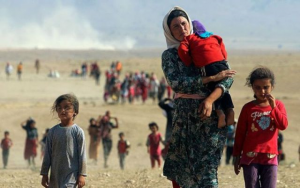A Contribution in Commemoration of the Annual International Day of Religious Freedom-Century of Genocides: End or Continuity?

This essential, universal human value is currently seriously restricted or attacked in the majority of the world’s countries and territories representing 74% of the total world population (Pew Study Center Report, 2013). The day also reminds people of the hard, long, often bloody road from serfdom, deep societal divisions, sectarian hatred, and violent oppression against efforts to form free, pluralist and tolerant societies respecting the rule of law, human rights and basic universal values. No society is the perfect role model in this, but we learn as we go. Many peoples, communities, leaders and governments in Europe, Asia, Africa, Americas, Australia and Oceania struggle to improve the quality of democracy, to embrace and care more about these principles and values. Many dictators, autocratic regimes and violent groups struggle in the opposite direction: they proclaim rule without law instead of the rule of law; the power over people instead of the service to people…
While more than 84% of people in the world can be described as “religiously affiliated” (ibid.), FoRB is more widely applied. It is a fundamental freedom relevant for all, as it also covers the rights of atheists, agnostics, and non-believers. The right to freedom of thought, conscience, religion or conviction is linked to the freedom of expression, of assembly and other important civil and political rights. FoRB is a litmus test of all human rights, because when the religious freedom is missing then other civil freedoms are missing as well. More www.foref-europe.org










Comments